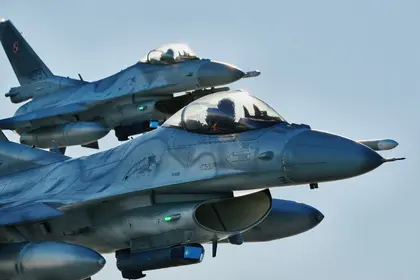On Feb. 23, The Hill published part one of this two part op-ed. In short, it laid out the case for providing Ukraine with fighter aircraft. Now, I’ll lay out the argument for the F-16. First, to dispel favoritism, when comparing strictly 4th generation fighters (F-16, Typhoon, Gripen, M2K, etc.), there is little to be gained from one to the next. They are relatively equal. If it were merely a question of the vehicle, all would suffice. But it’s not. The F-16 “capability” has something the others do not.
- Check out the newest war in ukraine update in the Kyiv Post’s news pieces published today.
- Get the freshest Ukraine news updates as of today.
The Netherlands, Belgium, Greece, Turkey, Norway, Denmark, Portugal, Israel, Egypt and Poland have been flying over 1,000 F-16s for up to three decades. In these Air Forces, personnel usually remain with one career field. As a result, there are thousands of retired or separated well-trained F-16 support personnel across the continent. Extend that globally and the number jumps to over 10,000 who have supported the now 4,500-plus F-16s built to date (and still counting). This pool of trained personnel is the key to an accelerated employment of airpower for Ukraine.
JOIN US ON TELEGRAM
Follow our coverage of the war on the @Kyivpost_official.
The idea is simple. Ukrainian pilots fly the jets, contracted experts work on the aircraft while providing on-the-job training (OJT) to Ukrainian Air Force ground support personnel. Weeks ago, the concept of a fully leased fighter squadron gained some traction in the media, including Kyiv Post and Newsweek. While provocative, the articles stirred debate and made people realize that innovation and breaking long-standing structures are needed to get Ukraine the aircraft they require.

Trump Makes 90 Day Foreign Aid Freeze – Ukraine Military Support Supposedly Untouched
It’s not only possible but also affordable. For $15 million, roughly 100 instructor qualified F-16 ground personnel (1 percent of the 10,000 talent pool) would receive $100k each for six months of work, 12 hours on / 12 hours off, without weekends. That consumes $10 million, with $5 million remaining. From that, you could pay for a handful of leadership positions, with remaining funds covering overhead and profit for the military contracting company. While $15 million is a considerable amount of money, it’s worth noting that the total is less than the cost of one F-16, it’s a onetime cost, and nearly a rounding error in the billions offered to Ukraine.
Cynics will be quick to point out the risk to personnel operating in Ukraine and additional costs, like room and board. Both are true, but manageable, as many of those same cynics know contractors have been operating on coalition military installations in combat zones for decades.
Their task? Support initial F-16 operations and provide OJT for Ukrainian maintainers. According to an F-16 U.S. Air Force maintenance officer, Lt. Col. “Doe” who has asked to remain anonymous, a fighter generation squadron comprises approximately 300 personnel. With the 100 contractors and 200 Ukrainians, the workforce is filled. That is enough to support a fleet of 24 F-16s. After six months, contractors would be released, backfilled by more Ukrainians. The Ukrainian Air Force would have indigenous F-16 capability.
When presented the idea, Lt. Col. Doe said the concept has merit, and he should know. He has overseen maintenance operations on a handful of different fighters, and bombers. Of note, the Lt. Col. stated initial aircraft maintenance training is on the order of a year or more, but conversion training, or taking an already trained individual from one aircraft and teaching him on the new one is on the order of months.
“If Ukraine has current and qualified aircraft maintainers for their existing fighter force, there’s a good possibility this could work,” he said.
Clearly, the timelines from existing training courses are shorter, but a recent article stated Ukrainian tank students were grasping training in a matter of “weeks not the expected months.”
Ukrainians are also speeding through Patriot training. This is not shocking given the students are motivated by the potential annihilation of their nation.
To think that Ukrainian Air Force ground personnel and pilots require the full amount of existing training structures is both pessimistic and unrealistic. They are also data-points often used by those opposed to Ukrainian assistance.
Finding and hiring personnel would be a challenge, but far from impossible. Large defense contractors have people who do this for a living. Given Poland has F-16s, their bases could easily serve as a quick “spin up” for refreshing the workforce on the viper. At present, the idea is a bit more than some scribbles on a wet bar napkin, but as many old USAF aviators say, “That’s where the best ideas originate.”
This concept, a leased fighter construct, or a fully outfitted Ukrainian squadron, are merely options, each having varying timelines, risks, and costs. What they all lack is Western leadership political will. Should that change, and the concept for a contracted ground maintenance force becomes reality, all I ask is for a fair cut of the profits. I’d simply like to donate them to Ukraine.
U.S. Air Force Colonel (Retired) Jeffrey H. Fischer (@JeffFisch) is the award-winning fiction thriller author of "Live Range" and "Balkan Reprisal." In his military career, he served seven combat tours, as well as assignments in the Pentagon, U.S. Embassies and NATO Special Operations Headquarters. He resides in Austria with his wife and son. His books are available globally on Amazon.
Disclaimer: The views expressed are the author’s and do not necessarily reflect the official policy or position of the department of defense, the U.S. government or Kyiv Post. The public release clearance of this publication by the department of defense does not imply department of defense endorsement or factual accuracy of the material.
You can also highlight the text and press Ctrl + Enter










